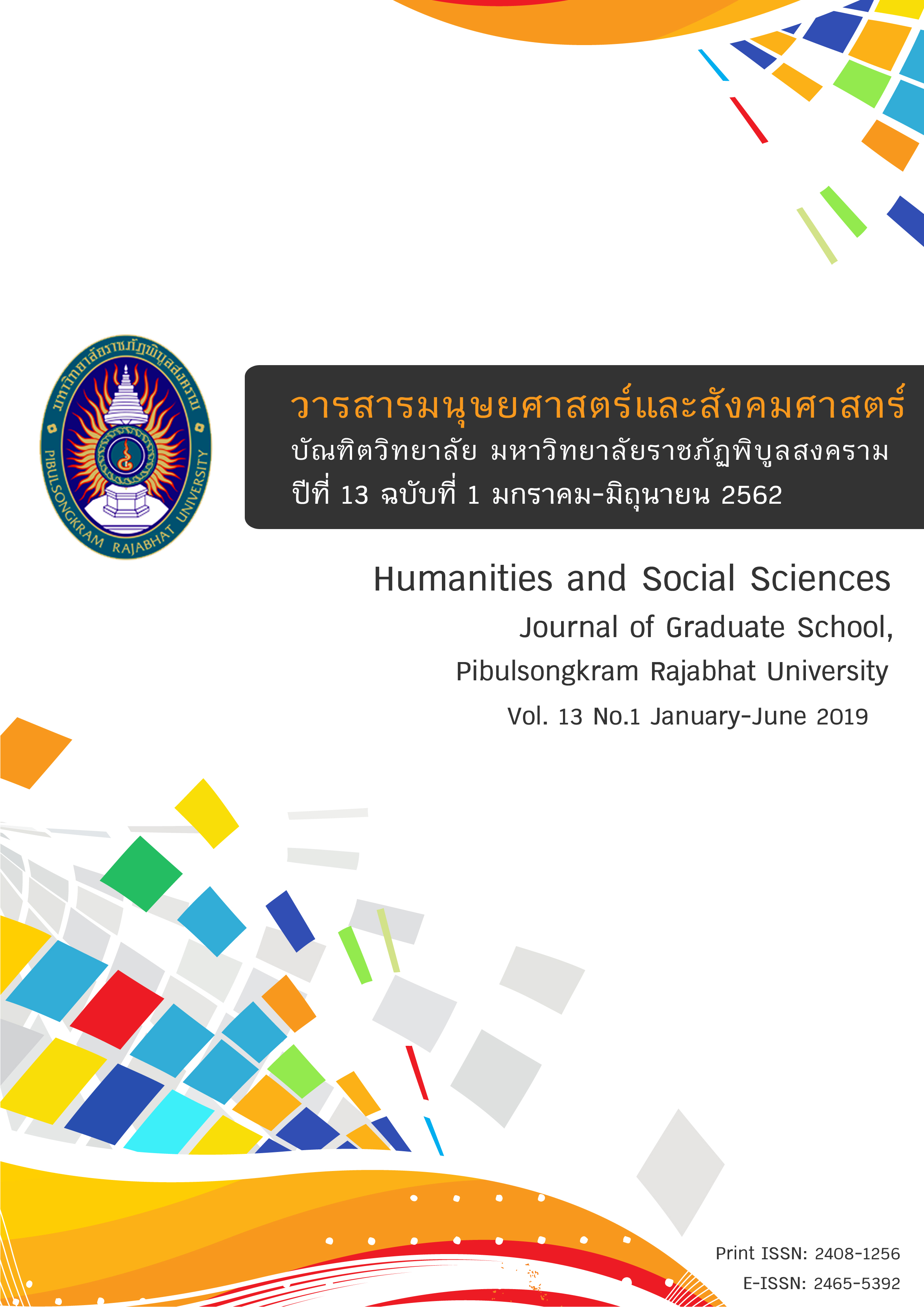A Program Development to Enhance Senior Scouts’ Leadership in Schools under the Office of the Basic Education Commission
Keywords:
Development a program, Confirmatory factor analysis, Scouts’ leadershipAbstract
The purposes of this research were 1) to analyze the confirmatory factor analysis of leadership attributes of senior scouts in schools under the Office of the Basic Education Commission (OBEC), 2) to develop a program for enhancing the senior scouts’ leadership. As for a research sample, stratified random sampling was conducted to select 700 senior scouts from schools under the OBEC in lower north of Thailand. The ratio of 10: 1 (Hair et al., 2010), which has 70 parameters. The sample schools in each educational area were randomly selected by 1 educational area for 1 school. 9 experts in group discussion were selected by purposive sampling to determine the suitability of the program. The research instrument was a questionnaire. The data from program evaluation forms, program manuals were statistically analyzed including mean and standard deviation by SPSS. Additionally, the LISREL program was used for confirmatory factor analysis.
The findings were as follows:
- The leadership attributes of senior scouts in schools under the OBEC were composed of 5 components with 30 observed variables, that is, 1) a component of Society with 10 observed variables, 2) a component of Courage with 5 observed variables, 3) a component of Oath with 6 observed variables, 4) a component of Unity with 4 observed variables, and 5) a component of Tact with 5 observed variables. For checking the congruence of model for analyzing components of leadership attributes of senior scouts in the schools, it was in accordance with empirical data at 364.81 of Chi-Square, 323 of Degree of Freedom, 0.97 of Goodness of Fit Index (GFI), 0.95 of Adjusted Goodness of Fit Index (AGFI), and 0.01 of Root Mean Square Error of Approximation (RMSEA).
- The result of program development was that the program for enhancing senior scouts’ leadership was the participation system, the support system and the development method senior scouts’ leadership.
References
เกรียงศักดิ์ เจริญวงศ์ศักดิ์. (2551). สร้างภาวะผู้นำในเด็กและเยาวชนไทย. สืบค้น 16 สิงหาคม 2560, จาก http://www.moe.go.th/moe/th/news/detail.php?NewsID=2567&Key=hotnews.
จิมมี่ ทองพิมพ์. (2552). การพัฒนาหลักสูตรฝึกอบรมเพื่อเสริมสร้างลักษณะผู้นำที่ดีของนักเรียนชั้นมัธยมศึกษาตอนต้น (วิทยานิพนธ์ปริญญาดุษฎีบัณฑิต). มหาวิทยาลัยวงษ์ชวลิตกุล, นครราชสีมา.
บุญใจ ศรีสถิตย์นรากูร. (2555). การพัฒนาและตรวจสอบคุณภาพเครื่องมือวิจัย: คุณสมบัติการวัดเชิงจิตวิทยา. กรุงเทพฯ: จุฬาลงกรณ์มหาวิทยาลัย.
ปิยะพันธ์ ชัยเสนา. (2557). การพัฒนาโปรแกรมเสริมสร้างภาวะผู้นำของนักเรียนระดับชั้นมัธยมศึกษา สังกัดสำนักงานคณะกรรมการการศึกษาขั้นพื้นฐาน. วารสารศึกษาศาสตร์ มหาวิทยาลัยขอนแก่น, 37(1), 92–99.
ไพศาล จันทรภักดี. (2548). การพัฒนาภาวะผู้นำเยาวชน ระดับมัธยมศึกษาตอนปลาย โรงเรียนมัธยมศึกษา สังกัดสำนักงานคณะกรรมการการศึกษาขั้นพื้นฐาน กระทรวงศึกษาธิการ โดยใช้กระบวนการหลักสูตร (วิทยานิพนธ์ปริญญาดุษฎีบัณฑิต). มหาวิทยาลัยนเรศวร, พิษณุโลก.
ภมรศรี แดงชัย. (2556). สสค. เปิดผลสำรวจทักษะของเด็กไทยในศตวรรษที่ 21. สืบค้น 16 ตุลาคม 2560, จาก http://www.qlf.or.th/Home/Contents/570.
ยุทธนา อุทโธ. (2557). รูปแบบการพัฒนาภาวะผู้นำเชิงสาธารณะของคณะกรรมการสภานักเรียน ระดับประถมศึกษา สังกัดสำนักงานคณะกรรมการการศึกษาขั้นพื้นฐาน ในเขตภาคตะวันออกเฉียงเหนือ (วิทยานิพนธ์ปริญญาดุษฎีบัณฑิต). มหาวิทยาลัยราชภัฏสกลนคร, สกลนคร.
รังสรรค์ ประเสริฐศรี. (2551). ภาวะผู้นำ (พิมพ์ครั้งที่ 2). กรุงเทพฯ: ซีเอ็ดยูเคชั่น.
วันวิสาข์ กันทาทอง. (2558). ภาวะผู้นำเยาวชนขององค์กรคนรุ่นใหม่เพื่อสันติภาพ. วารสารวิจัยและพัฒนา มหาวิทยาลัยราชภัฏสวนสุนันทา, 7(1), 115–124.
สำนักงานสถิติแห่งชาติ. (2558). วิเคราะห์เด็กและเยาวชน. กรุงเทพฯ: บางกอกบล็อก.
สำนักบริหารงานการมัธยมศึกษาตอนปลาย สำนักงานคณะกรรมการการศึกษาขั้นพื้นฐาน. (2559). แนวทางจัดการเรียนรู้ในศตวรรษที่ 21 : 21st Century Skills. สืบค้น 19 ตุลาคม 2560, จาก https://webs.rmutl.ac.th/assets/upload/files/2016/09/20160908101755_51855.pdf.
สุทัศน์ เมาลีกุล. (2556). การลูกเสือโลก (พิมพ์ครั้งที่ 2). กรุงเทพฯ: สกสค. ลาดพร้าว.
สุวิมล ติรกานันท์. (2551). การสร้างเครื่องมือวัดตัวแปรในการวิจัยทางสังคมศาสตร์: แนวทางสู่การปฏิบัติ (พิมพ์ครั้งที่ 2). กรุงเทพฯ: จุฬาลงกรณ์มหาวิทยาลัย.
สุเวศ กลับศรี. (2556). การพัฒนากิจกรรมลูกเสือเพื่อสร้างภาวะผู้นำของเยาวชนไทย. (วิทยานิพนธ์ปริญญาดุษฎีบัณฑิต). มหาวิทยาลัยวงษ์ชวลิตกุล, กรุงเทพฯ.
โสมฉาย บุญญานันต์. (2549). การพัฒนาทฤษฎีโปรแกรมการปลูกฝังจิตสำนึกต่อสิ่งแวดล้อม: การวิจัยพหุเทศะกรณีเพื่อการออกแบบและประเมินโครงการ (วิทยานิพนธ์ปริญญาดุษฎีบัณฑิต). จุฬาลงกรณมหาวิทยาลัย, กรุงเทพฯ.
Chen, H. T. (2005). Practical program evaluation: Assessing and improving planning, implementation, and effectiveness. Thousand Oaks, Calif: SAGE Publications.
Hair, J. F., Black, W. C., Babin, B. J., & Anderson, R. E. (2010). Multivariate data analysis (7th ed.). New Jersey: Prentice-Hall.
Downloads
Published
How to Cite
Issue
Section
License
บทความหรือข้อคิดเห็นใดใดที่ปรากฏในวารสารมนุษยศาสตร์และสังคมศาสตร์ มหาวิทยาลัยราชภัฏพิบูลสงครามเป็นวรรณกรรมของผู้เขียน ซึ่งบรรณาธิการไม่จำเป็นต้องเห็นด้วย บทความที่ได้รับการตีพิมพ์เป็นลิขสิทธิ์ของวารสารมนุษยศาสตร์และสังคมศาสตร์ มหาวิทยาลัยราชภัฏพิบูลสงคราม







